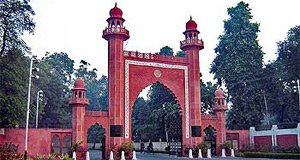 Education, reconciliation, peace and progress are once again the need of the times as they were more than a century ago
Education, reconciliation, peace and progress are once again the need of the times as they were more than a century ago
By Inam Abidi Amrohvi
The Aligarh Muslim University (AMU) in India for almost a century has been a beacon of hope to millions of Muslims seeking low-cost, quality education in India. The man behind it, Sir Syed Ahmad Khan, thought of progressive Muslim education on a scale rarely attempted earlier and against formidable odds.
Today, AMU has more than 30,000 students on its campus and offers more than 300 courses. Over the years, it also paved the way for several other minority institutions in India. That said, there’s a lot still left to be done in improving the lot of Indian Muslims.
Muslims in India constitute some 14 per cent of the total population, which makes their social and educational progress fairly important in the national context. As the Sachar Commission Report of 2005 observed, the literacy rate among Indian Muslims in 2001 was 59 per cent, which is far below the national average of 65.1 per cent.
If a progressive and persuasive Muslim leadership in the footsteps of Sir Syed seriously take up the recommendations of the Sachar report, such statistics could change dramatically.
Sir Syed used education as a tool for social change. This is something which works in any age. Education equips you with the right knowledge to look at the bigger picture. It makes you respect the opinion of others even when you don’t agree. The end result would be a more tolerant society. Tolerance promotes peace!
Sir Syed worked for the British East India Company for a fairly long period. He had a progressive mindset and highlighted areas of shared interest between the Christians (rulers of British India) and Muslims (natives). To send home his point, he even wrote a commentary on the Bible (Tabyin-ul-Kalam) — the first by a Muslim.
The brutal crackdown on Muslims that followed the Sepoy Mutinee of 1857 or the first Indian war of Independence, resulted in a lot of bad blood between the Christian and Muslim communities.
Driven by the events, Sir Syed came out with his most famous literary work, Asbab-e-Baghawat-e-Hind (The causes of the Indian Revolt). It was mainly to dispel the theory of the revolt being mainly a Muslim conspiracy. He argued that the British failed to recognize the rights of the natives in their own land. But he also blamed his own community, admonishing them for giving patronage to religious orthodoxy and a failure to keep up with modern times. We should take a leaf from this approach.
Either you fight violence with more violence or you seek reconciliation. As we have seen in Afghanistan and Iraq, there is no end to war. The more it drags, the more radicalized the society becomes. The message that should pass on from father to son should be one of peace and forgiveness.
Sir Syed was well aware of the changing times and how progress was eluding the Muslim community because of its isolation. He was of the view that nothing in Islamic belief and practice could oppose reason. He even wrote an unfinished commentary of the Holy Quran to further his point. We may or may not agree with his view, but his basic philosophy was right, Quran talks about sciences and the importance of learning. In other words, a believing Muslim should also be a seeker of knowledge, wherever it takes him to.
Sir Syed looked at modern scientific education as an enabler of social and economic growth of Indian Muslims. The first school he opened was at Moradabad in 1858, to teach modern history. He thought it would help Muslims to learn about other civilizations and societies and how they failed when they did not keep up with changing times. That’s what history is all about — lessons! We read it so as to not make the same mistakes. The events in Egypt and Libya serve as a grim reminder for all those in position of power. An unjust rule never lasts forever!
With an eye on Muslim representation in government and civil services, Sir Syed established the Mohammedan Civil Services Fund Association to encourage and help aspiring Muslim graduates. It shows that every single citizen could play an active role in nation-building. The success of a country depends on the level of participation of its people. A sense of ownership is much better than a mere display of patriotism.
It’s not mere coincidence that the global Muslim community finds itself in the same position as more than a century ago. Turmoil in the Arab world, paranoia about Islam and Muslims in the West and a surge in extremism are the same obstacles that Sir Syed had started with. That makes the methods he adopted to counter such problems all the more relevant today. Education, reconciliation, peace and progress are once again the need of times.
As we celebrate another anniversary of this great reformer, it is time to spend a few thoughts on the great cause to which Sir Syed dedicated his life. We need to understand and appreciate his model of Muslim empowerment.
The original Aligarh Movement was based on the principle of change from within and a tolerant worldly outlook. It aimed at equipping Muslims with modern education, something which even the religion permits. This is the legacy that Sir Syed Ahmad Khan left behind and which holds true to this day.
If one man can bring about so much change, 100 others across the globe could do much more!
- Inam Abidi Amrohvi is a Dubai-based Indian businessman and writer. He is originally from Lucknow, India.

